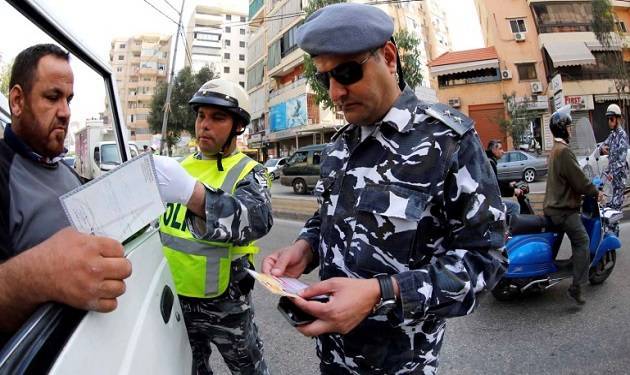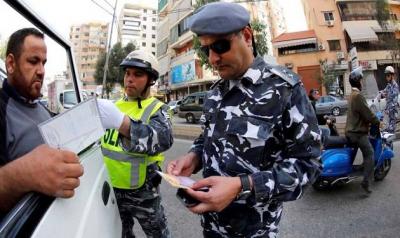The resentment towards the "state," which is either absent or forcibly disengaged from crafting solutions for public sector employees to end their strike, escalates. The state finds its remedy in the empty pockets of citizens, compensating for the desired reforms in state institutions by imposing further burdens on them due to the temporary awakening to enforce traffic laws, specifically regarding the issuance of citations for violators, while neglecting traffic safety for drivers on "death roads."
In a state of law and institutions, overlooking the application of the law is a paradox; however, in Lebanon, amid the disintegration affecting state institutions, the Interior and Municipalities Minister Judge Bassam Mawlawi's request to security forces to strictly enforce the traffic law came as a shock to citizens yearning to regain the "prestige" of the state amidst traders and monopolists controlling their livelihoods. This comes alongside the arrest of "thefts gangs," including last week's theft of an electricity transformer that supplies the Internal Security Forces and the Justice Palace in Jdeideh Matn.
The "insufficiency" of the minister's decision doesn’t stop here, according to social media users, as it coincides with the open strike of public sector employees, resulting in a de facto "closure" of the Vehicle Registration and Licensing Authority (the “Mouafaa”), which is the inevitable destination for citizens to regularize their vehicles when the judicial police decide to impound them, thereby compounding their burdens.
Regarding the coincidence of the closure of the “Mouafaa” with the campaign to tighten traffic law enforcement, the President and General Director of the Vehicle Management and Licensing Authority, Engineer Huda Saloum, explains that the forced shutdown of the “Mouafaa” is due to the strike undertaken by financial employees, which adversely affects citizens and prevents them from regularizing their vehicles and releasing them from impoundment. Additionally, it hinders their ability to register vehicles and pay due fees, alongside acquiring and renewing expired driving licenses, placing them in a real predicament with insurance companies in the event of any traffic accident.
Saloum points out that there is no legal justification to consider the repercussions of incidents with insurance companies or security forces in the absence of renewed expired driving licenses. She emphasizes to "Nidaa Al-Watan" that the “Mouafaa” was not specifically on strike during the Ministry of Interior’s campaign to enforce the traffic law, but completing legal transactions at the “Mouafaa” remains stalled until the due fees are paid into the financial treasury, which cannot be done due to the refusal of treasury officials to resume work. This has led to a lockdown to mitigate the increasing burden on citizens and spare them the hassle of commuting to the “Mouafaa” without being able to finalize their transactions amid the ongoing rise in fuel prices.
Despite the work stoppage in the “Mouafaa” for the second week, Saloum insists that the campaign by the Ministry of Interior continues at the “Mouafaa,” effectively holding citizens hostage to the strike in the Ministry of Finance in order to regularize their vehicle’s legal status and release it from impoundment. This adds to the suffering currently faced by public administrations lacking the simplest means of resilience due to skyrocketing fuel prices, continuous electricity outages, and shortages of stationery, receipts, and driving license books, not to mention the observations raised by transaction facilitators regarding the sale of "car plate numbers" in the black market.
While Saloum is focused on finding solutions to the strike of public sector employees, including treasury officials, to meet citizens' needs, she affirms that no transactions can be completed without the payment of due fees, concluding with, "Hopefully, things will get better... God will provide... I cannot say anything!"
In a related context, informed sources have positioned the timing of the campaign launched by the Minister of Interior within the framework of enriching the state treasury with tax revenues from citizens’ pockets, specifically the distribution of traffic fines through reports, where 20 percent is allocated to the Internal Security Forces' reserve fund, 16 percent to municipalities, and 64 percent to the treasury. Meanwhile, fines collected from judicial rulings allocate 20 percent to the Internal Security reserve fund, 16 percent also to municipalities, with 30 percent deducted for the judges' solidarity fund, 20 percent for the cooperative fund for judicial assistants, leaving 14 percent for the treasury.
Given the ongoing strike of judicial assistants, how will citizens pay taxes, and how will funds be filled? Are exceptions in the judiciary established for the purpose of collecting taxes from citizens to revive the public sector from the revenues of these funds?




